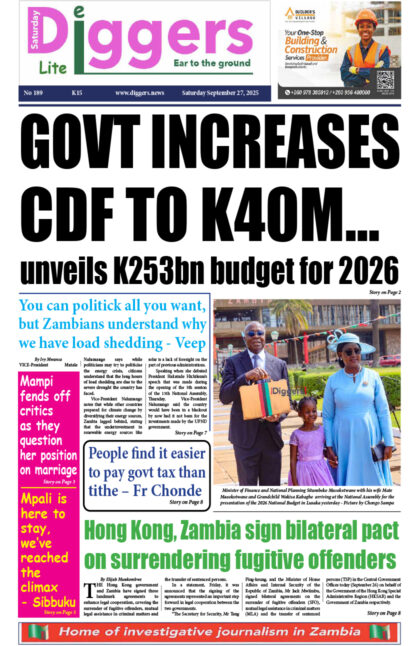Caritas Zambia says allegations that the church is being sponsored by opposition political parties whenever it speaks out about issues affecting Zambians, is a conspiracy which is nowhere near the truth.
Speaking at the launch of its strategic plan for 2018-2022, Caritas Zambia Secretary General Fr Cleophas Lungu said the church was worried about the continued deterioration of people’s livelihoods.
“The church gets concerned when the general livelihoods of the people continue to deteriorate. And whenever government policies seem not to improve the livelihoods of our people, especially the livelihoods of the poor, the vulnerable and the most marginalized. The Catholic Church in Zambia has continued to express its public concern,” Fr Lungu said.
“Despite being a rich nation with abundant natural resources, many people in Zambia continue to live in poverty. That paradox has not helped in a situation where the natural resources continue to be plundered while the many Zambians just watch. The conspiracy of silence is not helping the situation, it is actually killing us.”
He observed that the church was being labeled political whenever it spoke against irregularities in the governance system.
“On the other hand, when the church speaks out about these issues, it is sometimes accused of having been sponsored by the opposition parties and working with those who are pushing for regime change. Actually this cannot be any near to the truth but very near to the conspiracy [of] falsehood. The common phrase that we often hear is that the church has become too political. For example when the church asks about the huge sums of resources and funds or monies that auditor general’s report displays as being misapplied or missing, when someone asks about that, what wrong has this person done? The church following the mandate given to Caritas Zambia shall continue to play its mission [of] being the prophet of the time, of being the conscious of the nation, of being that voice of reason that calls a nation to order,” Fr Lungu said.
He also said that the 2018-2022 Caritas Zambia strategic plan was designed to respond to the route causes of the challenges that the church was worried about.
“The plan was designed to try and respond to the route causes of some of the challenges the catholic church has continued to worry about. These include political intolerance, increasing poverty among the poor, political violence, unfair political processes, poor adherence to the rule of law, and promoting agriculture methods that do not degrade the environment. We have seen and we are worried about the land issues and the extractive industry issues, the poor social accountability. We often hear of corruption and unfortunately we were just informed a day before yesterday that our perception as a country in terms of corruption is not improving. Instead of improving, it is getting worse. That is the worry of the church, that is a worry to Caritas Zambia,” Fr Lungu added.
And in its strategic plan, Caritas observed that government had been giving contradicting statements regarding the debt status of the country.
“Zambia’s rising debt has continued to raise concerns. Despite huge debt forgiveness, (approximately $7 billion) at the turn of the jubilee year 2000, external debt has again started accumulating. In 2015, external debt was US$6.41 billion and as at September 2016, the external debt had reached US$6.7 billion, representing 35 percent of the GDP. Current external debt (2017) stands at $7.56. The increase in the stock of debt was mainly due to the issuance of Eurobonds in 2012 ($750 million), 2014 ($1 billion) and 2015 ($1.25 billion),” read part of the strategic report which was presented by Caritas Zambia Head of Programmes Edmond Kangamungazi.
Caritas Zambia also echoed the observations of other stakeholders that there was indiscipline in the public Service in relation to the use of public resources.
“The 2015 Auditor General’s report showed glaring poor financial management by public entities thereby revealing a worrying growing culture of plunder of public resources; disregard and abrogation of laws with impunity, by people given the responsibility of managing public resources. The report revealed that government made irregular payments amounting to K115, 350, 860, in 2015 while K251, 523, 804 was paid for undelivered goods. Additionally, K12, 659, 892 obtained as imprest was not retired and revenue amounting to K558, 449 was unaccounted for,” read the strategic plan.
“This shows indiscipline in the public service. Over the years, the country has lost billions of kwacha, which have been reported by the Auditor General’s office and government has not taken any practical action to stop financial irregularities and the situation has continued to deteriorate. This continued mismanagement of public resources will undermine the attainment of Sustainable Development Goals (SDGs) and will continue to damage the social and economic fabric of the Zambian society.”























